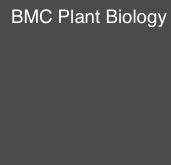- Submit a Protocol
- Receive Our Alerts
- Log in
- /
- Sign up
- My Bio Page
- Edit My Profile
- Change Password
- Log Out
- EN
- EN - English
- CN - 中文
- Protocols
- Articles and Issues
- For Authors
- About
- Become a Reviewer
- EN - English
- CN - 中文
- Home
- Protocols
- Articles and Issues
- For Authors
- About
- Become a Reviewer
A Reliable Method for Phytophthora cajani Isolation, Sporangia, Zoospore Production and in Planta Infection of Pigeonpea
Published: Vol 6, Iss 2, Jan 20, 2016 DOI: 10.21769/BioProtoc.1706 Views: 12645
Reviewed by: Samik BhattacharyaShahin S. AliAnonymous reviewer(s)

Protocol Collections
Comprehensive collections of detailed, peer-reviewed protocols focusing on specific topics
Related protocols

An Assay to Study Botrytis cinerea-infected Grapevine Leaves Primed with Pseudomonas fluorescens
Charlotte Gruau [...] Aziz Aziz
Oct 5, 2016 12843 Views

Assessment of Wheat Resistance to Fusarium graminearum by Automated Image Analysis of Detached Leaves Assay
Alexandre Perochon and Fiona M. Doohan
Dec 20, 2016 12751 Views

Quantification of the Composition Dynamics of a Maize Root-associated Simplified Bacterial Community and Evaluation of Its Biological Control Effect
Ben Niu and Roberto Kolter
Jun 20, 2018 10502 Views
Abstract
Pigeonpea (Cajanus cajan L.) is an important legume crop of rainfed agriculture. High levels of protein in pigeonpea make it a valuable protein source for developing countries. Phytophthora blight caused by Phytophthora cajani (P. cajani) is a potential threat to pigeonpea (Cajanus cajan L.) production, affecting the crop irrespective of cropping system, cultivar grown and soil types (Pande et al., 2011; Sharma et al., 2006). The primary mode of infection of P. cajani is sporangium and zoospore. Therefore, sensitive and reliable methods for zoospore production and estimating infection severity are desirable in case of Phytophthora blight of pigeonpea (Sharma et al., 2015). Here we present a protocol for isolation of P. cajani from infected plants, sporangia and zoospore production and in planta infection technique of pigeonpea seedlings. These methods will be important tool to devise a platform for rapid and reliable screening against Phytophthora blight disease of pigeonpea as well as for host x pathogen x environment interaction studies.
Keywords: Phyophthora cajaniMaterials and Reagents
- Cotton (Jaycot Industries)
- Glass slide (75 x 25 x 1.35 mm) (Blue star)
- Parafilm (Sigma-Aldrich, catalog number: P7793 )
- Petri dish (100 x 19.5 mm) (Borocil, catalog number: 5550300 )
- Phytophthora cajani isolate ICPC 1 (NCBI, GenBank Acc, catalog number: 10534 )
- Pigeonpea seedlings, cultivar ICP 7119
- Agar (HiMedia Laboratories, catalog number: RM201 )
- Ampicillin (Srlchem, catalog number: 61314 )
- Calcium carbonate (CaCO3) (HiMedia Laboratories, catalog number: GMR 397 )
- Dextrose (HiMedia Laboratories, catalog number: GRM077 )
- Dimethyl sulfoxide (DMSO) (Sigma-Aldrich, catalog number: 472301 )
- Ethanol
- Pentachloronitrobenzene (PCNB) (Purity: ≥ 94%) (Sigma-Aldrich, catalog number: P2205 )
- Pimaricin (Sigma-Aldrich, catalog number: P9703 )
- Rifampicin (Sigma-Aldrich, catalog number: R7382 )
- Sodium hypochlorite (Scribd Inc., Qualigens, catalog number: 27905 )
- Sterilized pond water
- Sterilized water
- Sterilized river sand
- V8 Agar media (HiMedia Laboratories, catalog number: M638 )
- Vermiculite (locally available)
- Tomato juice
- Tomato juice agar (see Recipes)
- V8 juice agar (see Recipes)
- PARP solutions (see Recipes)
- Tomato broth (see Recipes)
Equipment
- Autoclave (Tomy Seiko)
- Beaker (100 and 400 ml) (Borocil, catalog number: 1000D16 and 1000D23 )
- Conical flask (50 ml) (Borocil, catalog number: 4060012 )
- Cork borer (approximately 5 mm diameter)
- Greenhouse (25-28 °C)
- Haemocytometer (1/400 mm2 and 1/10 mm deep) (Sigma-Aldrich)
- Hot air oven (Thermo Fisher Scientific)
- Incubator (Temperature range: 5-60 °C, humidity: 0-100%) (Tomy Percival)
- Inoculating needle
- Horizontal laminar flow clean benches (Esco Micro Pte, Labculture, model: LHC-4C )
- Light microscope (OLYMPUS)
- Measuring cylinder (100 ml) (Borocil, catalog number: 3024016 )
- Plastic tray (30 x 48 x 10 cm)
- Test tube (18 x 150 mm) (Borocil, catalog number: 9820U06 )
Procedure
- Pathogen isolation
- Collect pigeonpea plants exhibiting Phytophthora blight symptoms (brown to dark brown lesions distinctly different from healthy green portions on main stem, branches and petioles) from infected field (Figure 1).
- Place symptomatic plant materials in labelled plastic bags for transportation in cooler box (4 °C) and store in 4 °C until fungal culture were isolated and purified from the samples in the laboratory.
- Select stem tissues with typical Phytophthora blight lesions for isolation of the pathogen Phytophthora (Figure 1).
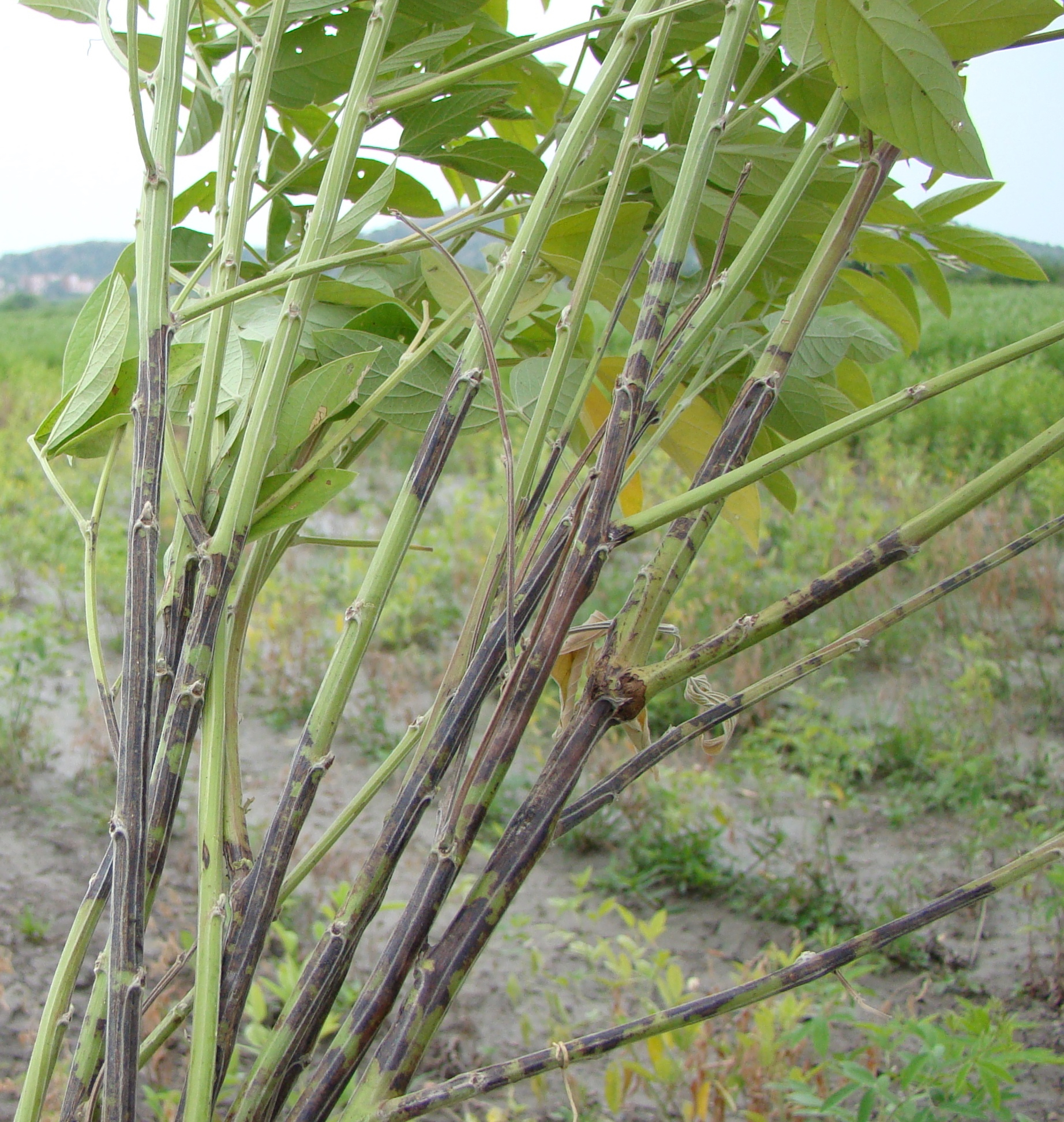
Figure 1. Phytophthora blight lesions on pigeonpea stem - Cut symptomatic tissues in small pieces and surface sterilise with 1% sodium hypochlorite for 1 min followed by 2-3 times washing in sterile distilled water.
- Place the surface cleaned tissues onto sterilized V8 juice agar media in a Petri-plate (Figure 2) (V8 juice supplemented with L-Asparagine, CaCO3, glucose, yeast extract and agar) amended with PARP antibiotics (pimarcin 400 μl; ampicillin 250 mg; rifampicin 1,000 μl; and pentachloronitrobenzene 5 ml.L-1 media) (see Recipes for detail).
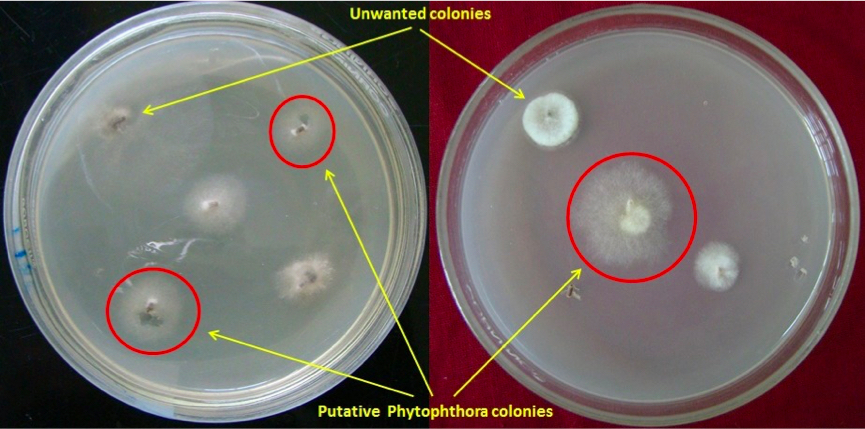
Figure 2. P. cajani (indicated with red circle) colony isolated from infected stem tissue of pigeonpea on V8 juice agar media - Incubate plates at 25 °C in the 12 h/12 h day-night photoperiod for 3-4 days.
- Transfer putative Phytophthora colonies (indicated with red circle in Figure 2) to 20% tomato extract agar (tomato extract 200 ml, CaCO3 2 g and agar 20 g.L-1 , see Recipes for detail) and again incubate at 25 °C in the 12 h/12 h day-night for 7 d (Figure 3).
- Further subculture is done after every 15-20 days.
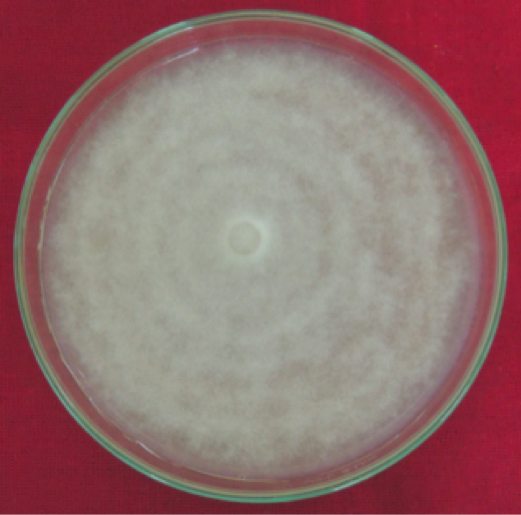
Figure 3. Purified P. cajani isolate on tomato extract agar media - Identify the culture based on morphological characters like mycelial type and sporangia shape as well as molecular level using ITS region sequencing.
- Maintain cultures under in vitro at 18 ± 1 °C in darkness.
- To maintain the pathogen virulence, prepare new cultures every 2-3 months by passing the pathogen through the host and reisolating from infected plants.
Note: All the steps have to be performed under aseptic conditions in horizontal laminar air flow system.
- Collect pigeonpea plants exhibiting Phytophthora blight symptoms (brown to dark brown lesions distinctly different from healthy green portions on main stem, branches and petioles) from infected field (Figure 1).
- Sporangia and zoospore production
- Choose virulent isolate of P. cajani for sporangia and zoospore production.
- Place one piece (5 mm) of mycelial bit from actively growing pure culture (5-7 day old culture) in 100 ml conical flask containing 25 ml of 20% tomato extract broth and incubate at 25 °C under dark condition for 72 h for mycelial growth (Figure 4A-B).
- After 72 h of incubation, decant tomato extract broth from flask and wash the mycelial mat with sterilized water and replace with 25 ml of sterilized pond water. Incubate again at 25 °C for 4 h in the darkness (Figure 4C).
- Decant the sterilized pond water and replace again with sterilized pond water and incubate for 3 h in the darkness.
- Repeat step 4 for one more time and incubate flask containing the mycelia again at 25 °C for approximately 20 h in the darkness (Figure 4D).
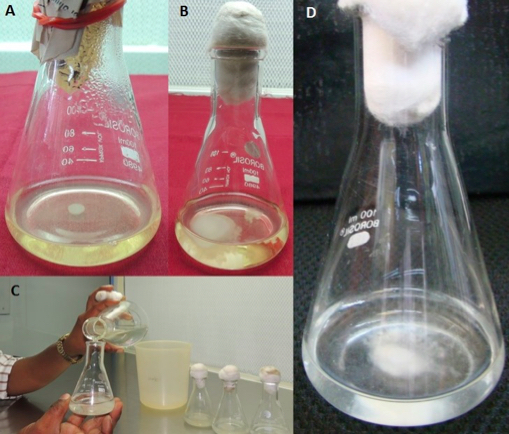
Figure 4. P. cajani sporangia and zoospore production. A. Inoculated tomato extracts broth with P. cajani mycelial bit. B. Mycelial mat after 72 h post incubation. C. Replacement of tomato extracts broth with sterilized pond water. D. Mycelial mat in sterilized pond water. - Observe sporangial initiation after 6 h during an incubation period and abundant sporangial production (mature sporangia) after 15-16 h under the light microscope (Figure 5A).
- Numerous swimming zoospores were noted within 16-20 h (Figure 5B-C). Zoospore concentration was determined using a haemocytometer and adjusted to desired concentration (1.5 x 105 ml-1) via dilution with sterilized deionized water and used for in planta infection.
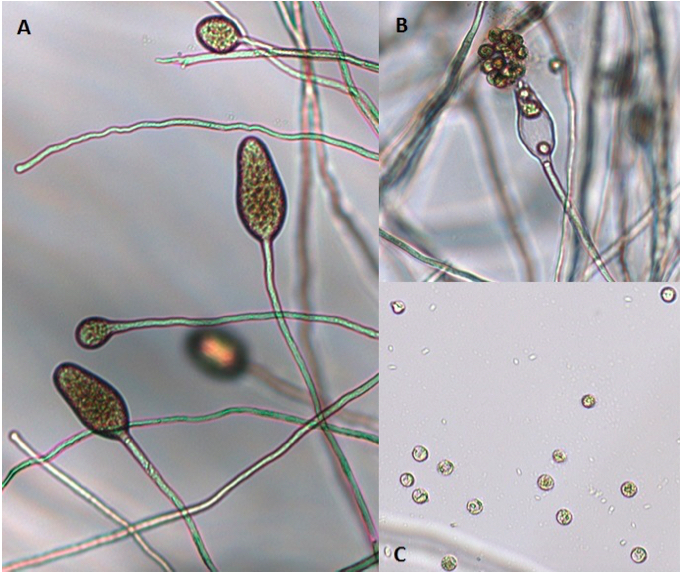
Figure 5. Sporangia and zoospore of P. cajani isolate ICPC 1. A. Mature sporangia after 15-16 h incubation. B. Zoospore release from mature sporangia. C. Swimming zoospores after 16-20 h incubation.
- Choose virulent isolate of P. cajani for sporangia and zoospore production.
- In planta infection with zoospore
- Take apparently healthy seeds of any susceptible variety to P. cajani, in our case ICP 7119 (HY3C).
- Surface sterilize the seeds in sodium hypochlorite (1% v/v) for 2-3 min and then wash in sterile distilled water 2-3 times.
- Sow the sterilized seeds in plastic trays (35 x 25 x 8 cm) filled with a mixture of sterilised river sand and vermiculite (10:1 v/v) in a greenhouse maintained at 25-28 °C under natural light conditions for 7 day. Ten rows were sown in each tray and each row consisted of eight seeds (Figure 6A).
- Saturate the 7 day old seedlings grown in trays containing mixture of sand and vermiculite with sterilized water.
- Inoculate seedlings with diluted zoospore suspension usually containing 1.5 x 105 zoospores/ml (approximately 2 ml of zoospore suspension per plant) (Figure 6B).
- Trays with inoculated seedlings were kept in greenhouse at 28 ± 2 °C under ambient light conditions. Similar number of seedlings inoculated with only sterilized water served as un-inoculated control.
- After zoospore inoculation, flood the trays with sterilized water for 48 h and maintain saturation thereafter till completion of experiments (Figure 6C).
- After 5-7 day of infection, count the infected plants and calculate the disease incidence by estimating the percentage of plants infected with Phytophthora blight (Figure 6D).
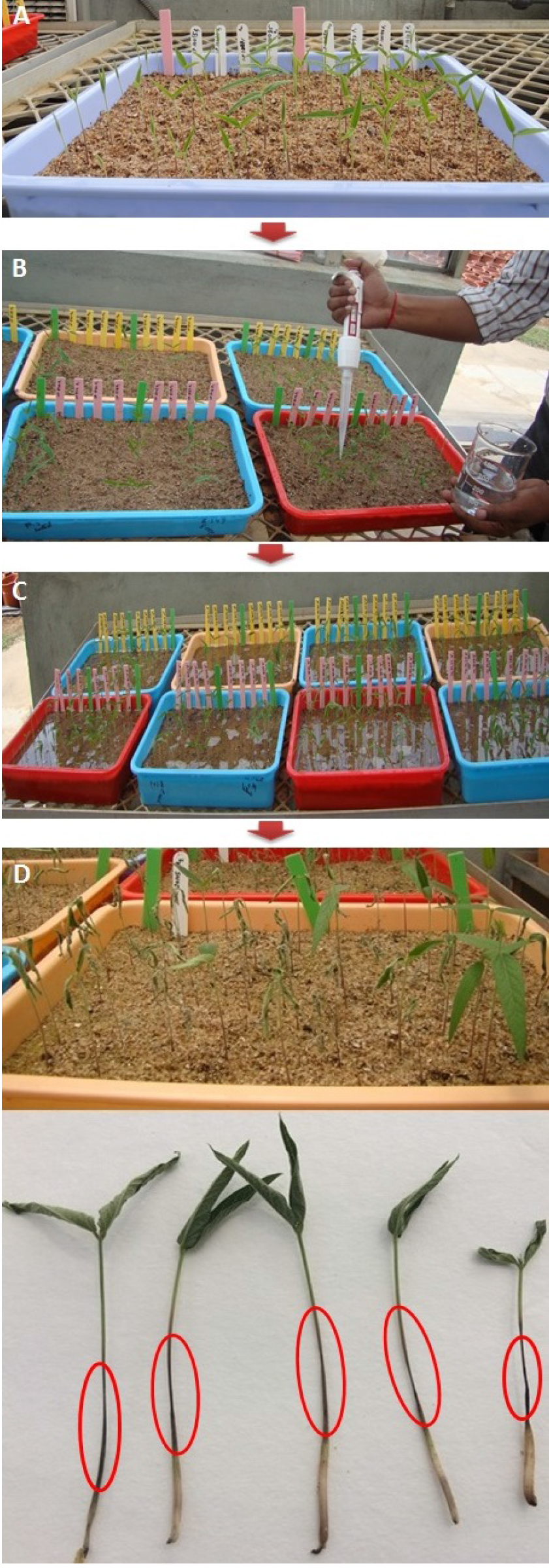
Figure 6. In planta infection of pigeonpea with P. cajani zoospore. A. Seven days old seedlings on sterilized sand and vermiculite mix. B. Inoculation of pigeonpea seedlings with P. cajani zoospore. C. Inoculated seedlings tray flooded with sterilized water. D. Phytophthora blight infected seedlings with lesions (indicated with circle).
- Take apparently healthy seeds of any susceptible variety to P. cajani, in our case ICP 7119 (HY3C).
Recipes
- Tomato juice agar (1 L)
200 ml tomato juice
2 g CaCO3
20 g agar
Combine tomato juice, CaCO3 and agar; bring to 1 L with water, mix on low heat
Autoclave for 20 min at 121 °C temperature and 15 lbs pressure - V8 juice agar (1 L)
Suspend 44.3 g V8 juice agar media in 1 L distilled water on low heat
Autoclave for 20 min at 121 °C temperature and 15 lbs pressure - PARP solutions (1 L)
0.4 ml pimaricin (prepare 2.5 % aqueous solution of pimaricin)
0.25 g ampicillin
0.01 g rifampicin [suspend 10 mg Rifampicin in 1 ml of dimethyl sulfoxide (DMSO)]
5 ml pentachloronitrobenzene (PCNB) (dissolve 1 g PCNB to 200 ml ethanol at 70 °C in water bath)
Preserve these solutions at 4 °C in refrigerator
Add the required quantity of PARP in media before pouring in to the Petri dish - Tomato broth (1 L, 20%)
200 ml tomato juice
800 ml water
50 ml of tomato juice and 0.5 g CaCO3 in 950 ml of distilled water
Mix 200 ml tomato juice and 800 ml water
Autoclave for 20 min at 121 °C temperature and 15 lbs pressure
Acknowledgments
The funding support from Department of Science and Technology-Climate Change Division and National Food Security Mission (NFSM), Department of Agriculture & Cooperation, Ministry of Agriculture, Govt. of India is gratefully acknowledged. The authors are thankful for technical assistance from Mr. Bal Krishna and K Ramulu from Legumes Pathology group.
References
- Pande, S., Sharma, M., Mangla, U. N., Ghosh, R. and Sundaresan, G. (2011). Phytophthora blight of Pigeonpea [Cajanus cajan (L.) Millsp.]: an updating review of biology, pathogenicity and disease management. Crop Prot 30: 951-7.
- Sharma, M., Ghosh, R., Tarafdar, A. and Telangre, R. (2015). An efficient method for zoospore production, infection and real-time quantification of Phytophthora cajani causing Phytophthora blight disease in pigeonpea under elevated atmospheric CO(2). BMC Plant Biol 15: 90.
- Sharma, M., Pande, S., Rao, J. N., Kumar, P. A., Reddy, D. M., Benagi, V. I., Mahalinga, D., Zhote, K. K., Karanjkar, P. N. and Eksinghe, B. S. (2006). Prevalence of Phytophthora blight of pigeonpea in the Deccan Plateau of India. Plant Pathol J 22: 309-13.
Article Information
Copyright
© 2016 The Authors; exclusive licensee Bio-protocol LLC.
How to cite
Sharma, M. and Ghosh, R. (2016). A Reliable Method for Phytophthora cajani Isolation, Sporangia, Zoospore Production and in Planta Infection of Pigeonpea. Bio-protocol 6(2): e1706. DOI: 10.21769/BioProtoc.1706.
Category
Microbiology > Microbe-host interactions > Fungus
Microbiology > Microbe-host interactions > In vivo model > Plant
Plant Science > Plant immunity > Disease bioassay
Do you have any questions about this protocol?
Post your question to gather feedback from the community. We will also invite the authors of this article to respond.
Share
Bluesky
X
Copy link




